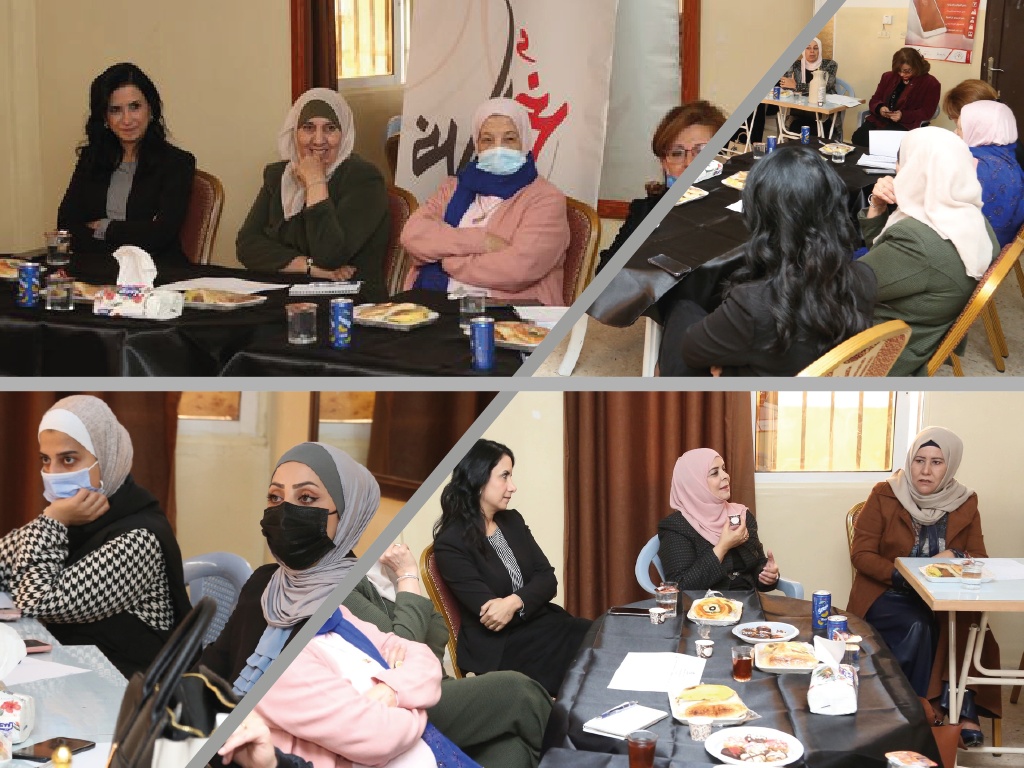As part of “Al Arba’tain” dialogue series, Al Nahda Women’s Network on November 24 held a session that focused on women’s experience in benefiting from the decentralization law and responding to the Covid-19 pandemic, hosted by Al Kiram Association in Mafraq.
The meeting discussed women’s efforts to help their communities and Syrian refugees during the Corona pandemic, and apply some of them to the parliamentary, municipal or decentralization elections.
Talking about women’s political engagement and participation in elections, Hamda Al Qsayreen, the first woman appointed to the Mafraq Municipal Council who had run for Parliament, said: “Running for elections is considered an achievement in itself because this used to be considered a right reserved to ministers, former MPs and tribal leaders.”
Lina Khazaleh’s, one of the participants, reinforced Qsyareen’s beliefs, talking about her experience with the decentralized elections and how she contributed to encouraging women to run for elections, besides contributing to increasing the number of women candidates.
Director of Al Kiram Association for Poor Families, member of Jordan National NGO’s Forum (JONAF), Najah Al Owaidat said “the association is one of the first to respond to the humanitarian crises and COVID-19 pandemic in Mafraq, where the association worked on many projects in education and humanitarian services, including providing meals to school students. During the corona pandemic, the association delivered meals to students, to their homes, and providing meals to Syrian refugees in Zaatari camp”. Al Owaidat said that she and her association seek to convey the voice of civil society to decision makers.
The heads and members of charity associations in Mafraq who participated in the meeting stressed that their membership in JONAF and working with the Arab Renaissance for Democracy and Development (ARDD) helped them realize the great value localization in humanitarian work, as it increases their strength and opens up new horizons for them.
The representative of the National Committee for Women’s Affairs, Diana Haddadin, said that “networking increases the strength of women, as the more alliances they have, the greater their opportunities and their power.”
She stressed that the success stories of women and their associations, or their success in reaching municipal councils, is appreciated by the National Committee for Women’s Affairs.
What ensures a better experience with decentralization for women , Haddadin said it is important for women to stay in constant communication with the committee, which is open to hearing their voices and coming to know the problems they face as members of local councils, adding that some women were bullied because they succeeded through the quota system by both women and men.
Haddadin said that the committee focuses this year on combating political violence against women, and will work on training women on decentralization, helping them become trainers who, in turn, will be able to train other women.
ARDD Executive Director Samar Muhareb said: “Since 2016, JONAF has worked with organizations and associations to ensure the success of the decentralization experiment.
“As the governorates, especially Mafraq and Irbid, were affected by the refugee crisis, which led to ignoring many of their needs, we started meetings with organizations and associations in Mafraq to determine the needed humanitarian work, including the one toward decentralization. It is not acceptable that relief work should be performed in the capital only, thus depriving these associations from participating in decision making.”
Muhareb added: ” At that time, our talk about decentralizing relief work was in line with talk about the decentralization law, so we found ourselves able to work along those lines. A group of 10 organizations succeeded, in partnership with the Ministry of Political Development, to draft the law and include local community committees in making this law, and we started training organizations to take advantage of this legislation and engage with local authorities, so as not to lose their presence,.”
Muhareb said “We might have felt that our efforts were useless, but when the corona pandemic struck, JONAF members, including the associations in Mafraq, achieved a success story through the relationship they had built with the local authorities before the pandemic; they were granted permission to move so they were able to distribute food and relief to areas under lockdown, and continued providing services to those in need, which proved that decentralization is not only a notion in a law, but can be applied when needed..
The meeting presented an opportunity to brainstorm on what should be done in order to activate the role of women in their societies and help them achieve greater success in their experience with decentralization. Participants agreed that such meetings should continue, and that their goal is to activate a social movement that leads to strong and effective institutional work.


